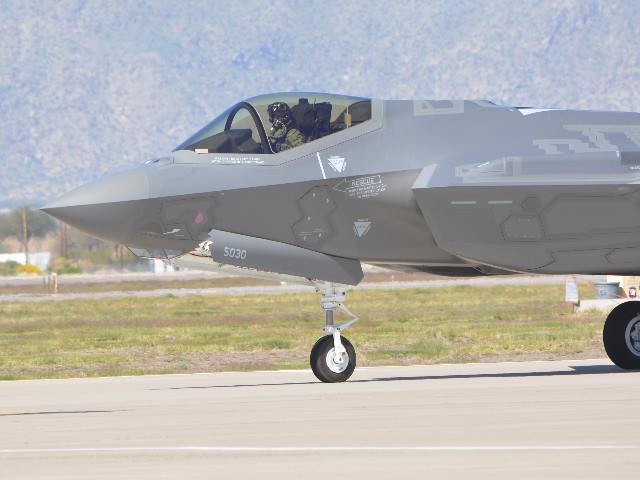
Britain will lose 2,000 US personnel but gain two squadrons of new F-35A fighters (pictured)
PENTAGON: The Pentagon giveth, and the Pentagon taketh away. While the Defense Department is shrinking or shuttering roughly 30 facilities across Europe, the real story isn’t a downsizing: It’s a shift. Even as the US consolidates facilities in Western Europe — some of which date to World War II — it’s building up infrastructure in Eastern Europe to contain the rising Russian threat.
The European Infrastructure Consolidation (EIC) announced this morning will pull the US completely or partially out of sites in Britain, Belgium, Germany, Italy, Portugal, and the Netherlands. Once $1.4 billion in shutdown costs are paid over the next few years, Defense officials said this morning, EIC should yield $500 million a year in savings. At the same time, however, the Pentagon’s pouring $985 million this year into the entirely separate European Reassurance Initiative (ERI), most of it for exercises, patrols, and other shows of force, but at least some for facilities in Eastern Europe.
“The infrastructure improvements [include], for example, building or augmenting barracks on existing bases in Europe that our troops are currently rotating through, to exercise with our European counterparts,” said Derek Chollet, assistant secretary of defense for international affairs, when I asked him at a press conference here this morning. “Up to this point, our troops who have been rotating through Central or Eastern Europe have been piggybacking on existing facilities that are perhaps not necessarily up to [it].”
Bases that often date to the Soviet era can require inefficient ad hoc measures to make them usable for modern US forces. Improving the infrastructure, Chollet said, “will therefore enable us down the road to continue our rotations, but at a lower cost.” In other words (not the ones the diplomatic Chollet would have chosen), it’s an investment in long-term deterrence against Putin’s Russia.
Those Eastern European improvements all fall under the European Reassurance Initiative. But the European Infrastructure Consolidation plan was carefully designed to keep intact US capacity, even as it closed facilities in Western Europe.
EIC is “consolidating and educing some existing support structure, [but] we are not affecting our operational capability,” Chollet emphasized.
Added John Conger, the acting deputy under secretary for installations, “we did not contemplate changes that reduced warfighting capability. That was a fundamental constraint” of the EIC process.
EIC’s biggest single hit is to the UK, where the US will pull all 3,200 personnel out of RAF Mildenhall and hand the base back to the Brits. But at the same time, in an entirely separate initiative — connected neither to EIC nor ERI — the Air Force will base two squadrons of its new F-35A Joint Strike Fighter to RAF Lakenheath, adding about 1,200 personnel. (The Brits are buying their own F-35s, specifically the F-35B “jump jet” model). Net, Britain will lose about 2,000 US personnel and Portugal about 500 (from Lajes Field in the Azores). Italy and Germany will actually gain a few hundred Americans each, despite the closure or downsizing of individual sites, as US units consolidate onto fewer, larger bases.
“When you leave a site, that reduces the requirements for supporting the site — the security, the public works, etc., etc.,” said Conger. It’s basically cutting overhead. All told, EIC will eliminate 1,200 US support positions (both military and civilian) and another 1,100 European ones. Another 6,000 US positions will be relocated and up to 1,500 Europeans.
So this consolidation will cost some people their jobs. Defense Secretary Chuck Hagel spent some of yesterday on the phone with the British, Germany, Italian, and Portugese defense ministers, Chollet said, and the Pentagon has been preparing its European partners for the blow for some time.
In the longer run, at least some Pentagon officials believe that taking their lumps in Europe puts them in a stronger position to ask Congress for a Base Realignment And Closure round at home. “I think so,” said Conger today. “Congress has raised several issues with regard to BRAC in the past, one of which was ‘please look at what your excess is overseas [first].'” Now the Pentagon has done that — and the 2016 budget request due next month will almost certainly request base closings.
Corrected: We had the European Reassurance Initiative pegged at an amazingly healthy $985 Billion. Oops. That should have been Million. Feb 23 5:31 PM
No service can fight on its own: JADC2 demands move from self-sufficiency to interdependency
Making all-domain operations a warfighting capability means integrating, fusing, and disseminating a sensor picture appropriate for a particular theater segment, not all of them, says the Mitchell Institute’s David Deptula.



























